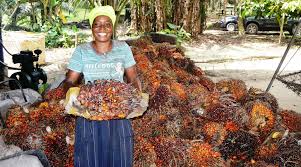Local
How Solidaridad Improved Oil Palm In Nigeria

By Augustine Adah
Solidaridad West Africa has digitally profiled more than 18,500 smallholder oil palm farmers and millers in Akwa Ibom, Cross River, Enugu and Kogi states within one year.
This effort is to support the government of Nigeria’s agricultural transformation policy agenda and the respective state governments to encourage more farmers embrace the oil palm intervention programme.
These achievements are made possible through The Kingdom of the Netherlands funded “National Initiative for Sustainable Climate-Smart Oil Palm Smallholders (NISCOPS)” programme in Nigeria.
The digital profiling of smallholder farmers and farm mapping is a continuous process in the lifespan of NISCOPS which started in 2019 through 2023 in the initial phase during which more smallholder farmers would be registered in the database of the programme.
After the digital profiling and farm mapping, series of trainings have been lined up to build the capacities of the smallholder farmer on sustainable climate-smart oil palm production.
NISCOPS supports the governments of Nigeria and Ghana to work with farmers towards more sustainable, climate-smart palm oil production, build capacity of smallholder farmers, organisations and local institutions to improve performance, facilitate development of mechanisms for sustainable landscapes and halting deforestation.
The programme is also contributing to the objective of Nationally Determined Contributions (NDCs) under the Paris Agreement and the Sustainable Development Goals (SDGs).
In its human capital development effort in Nigeria, 32 youth have been trained as enumerators in the use of digital tools for farmers’ and oil palm farm profiling in Akwa Ibom, Cross River, Enugu and Kogi States.
Dr. Samuel Ogallah, Solidaridad’s Senior Climate Specialist for Africa, said the role of private sector involvement in NISCOPS programme is key to the success of the programme in Nigeria just like all the participating states under the programme.
He called on private sector to join hand with Solidaridad in executing its programmes in the country.
He said, “In the wake of ovid-19 pandemic leading to the collapse of the oil price on which Nigeria depends as the major income earning for the country, it is high time Nigeria start to invest in “the other oil” which is palm oil”.
Investing in Palm oil industry according to Ogallah would increase the contribution of the agriculture sector to the national GDP thereby reducing unemployment and poverty in the country.
Solidaridad West Africa, Oil Palm Programme Manager, Nigeria, Kene Onukwube, said that “NISCOPS’ overall intervention pushes Nigeria’s march towards making the SDGs and the Paris Agreements a reality.
He said, profiling of oil palm farmers and their farms elevates Nigeria digital agriculture profile in two significant ways: it enhances the structural aggregation of oil palm farmers into organized farmer groups as well as strategically positioning them for increased economic investments.
This according to him is through proposed institutional interventions by government (e.g. through NIRSAL and other key policies of the Central Bank of Nigeria) and private sector growth initiatives targeted at palm oil SMEs.
In Nigeria, NISCOPS is being implemented by Solidaridad West Africa (SWA) in partnership with The Sustainable Trade Initiative (IDH).
While SWA implements in Akwa Ibom, Cross River, Enugu and Kogi States, IDH is implementing in Ondo and Edo states.
Solidaridad is a Dutch-based international development organization operating in 5 continents through 8 Regional Expertise Centres. With its Network secretariat in The Netherlands.
The organisation has over 50 years of global experience working in the development of profitable supply chains, creating sustainable businesses and livelihoods by promoting Good Practices, Climate-Smart Agriculture, Robust Infrastructure, Enabling Policy Environment and Sustainable Landscape Management.
Solidaridad West Africa operates in five countries of Ghana, Nigeria, Liberia, Sierra Leone and Ivory Coast. Since 2013, SWA (Nigeria) has trained over 27,000 farmers on Good Agriculture Practices (GAP). About 78% of the producers trained have adopted GAP and there has been about 40% increase in productivity.
In Nigeria, Solidaridad works also across various commodities in different parts of the country.
SWA services in Nigeria include supporting smallholder producers for increased productivity and improved facilities, market opportunities for farmers.
Others include facilitating and negotiating position of producers and workers in supply chain, credit and input access for small and medium scale enterprise farmers and stimulating public-private partnership.
Send Us A Press Statement Advertise With Us Contact Us
And For More Nigerian News Visit GWG.NG


